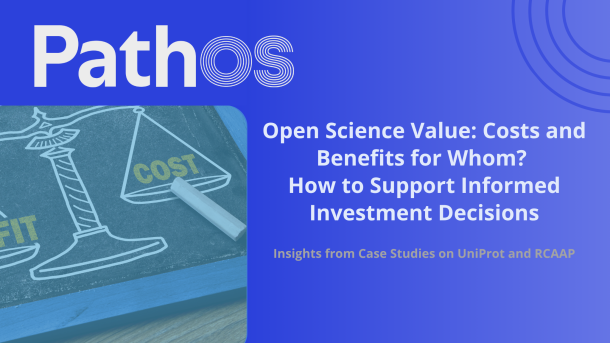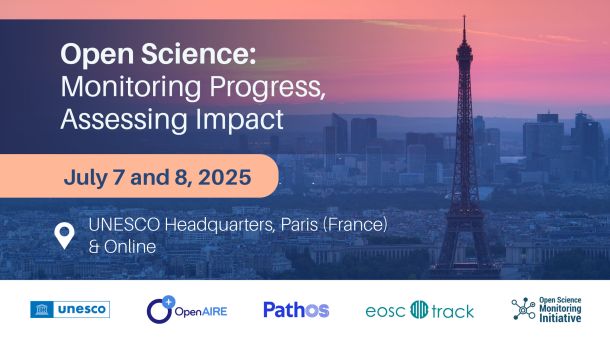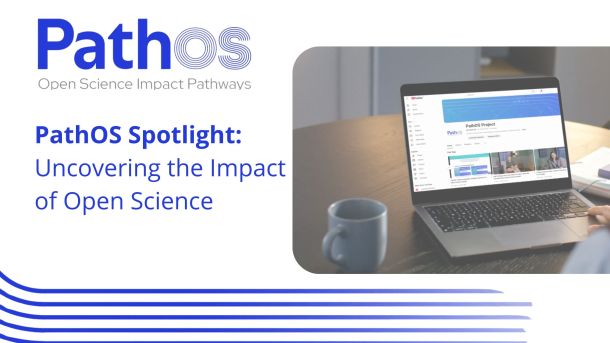Looking back: Policymaker workshop on Open Science impact pathways
Recap written by István Kárász, Technopolis Group, Lennart Stoy, Technopolis Group & Ioanna Grypari, Athena RC
In May 2023, PathOS hosted an invitation-only co-creation workshop to facilitate meaningful discussions around the development of impact pathways for Open Science. Key topics included the need for comprehensive impact indicators to capture the influence of Open Science, the potential of these indicators in guiding policy decisions and monitoring, especially in the EU funding context, and the necessity to monitor the implementation of UNESCO recommendations on Open Science.
The workshop brought forward diverse perspectives on the impacts of Open Science. It underscored the significant economic effects of Open Science, with examples citing policies in African countries. Participants also shed light on the transformative influence of Open Science on equity, participation, and respect for indigenous knowledge. Stakeholders highlighted that the objectives for implementing Open Science practices can vary based on context. National policies look more towards creating guidelines for long-term impacts while Research Infrastructures concentrate on direct societal or economic benefits.
Further, the workshop explored the potential of Open Science in enhancing the efficiency of the science ecosystem, promoting societal engagement, and fostering transparent governance. Participants recognized its potential in building public trust through open research, facilitating global collaborations, and driving economic and scientific advancements. They stressed potential benefits of Open Science practice on social justice, inclusion, and multilingualism while warning about risks of marginalisation and decreasing equity due to disparate Open Science implementations. The roles of public-private partnerships, fair public funding distribution, and international policies in furthering Open Science were underscored.
Participants concurred that measuring the impact(s) of Open Science policies is very challenging. New assessment methods and policy adjustments based on systematic overviews and sound evidence are urgently needed. An improved understanding of the impacts could also help communicating the benefit of Open Science for researchers and counteract perceptions of Open Science practices as an obligation with little benefits for the individual researcher. The resistance encountered in implementing Open Science, especially regarding research assessment practices, was recognized.
Against this background, the participants emphasised that the PathOS conceptual framework should permit a nuanced consideration of contexts, feedback loops, and assumptions in its further development. Additionally, participants underlined the significance of evaluating overlapping impacts across themes from both global and regional perspectives.
Participants displayed a strong interest to sustaining the momentum of this dialogue, with a specific emphasis on future research, regional variations, identification of negative impacts for potential policy interventions, and the conduct of evidence-based research, underscoring a shared goal of effectively navigating the challenges and advancing the principles and practices of Open Science.
Conclusions and looking ahead
In conclusion, the workshop served as a crucial first step for discussing the intricacies of impact pathways and the findings from the PathOS project with stakeholders. This workshop is part of an ongoing series of engagements by PathOS with global experts, highlighting the commitment to align project developments with the needs and insights of the broader Open Science community. The feedback from these interactions, including the outcomes of this workshop, will be instrumental in refining the PathOS work, ensuring its continued relevance, practicality, and impact.
Want to stay in touch with all PathOS updates? Make sure to sign up for our newsletter and follow us on twitter & LinkedIn.
Written by
Latest Articles

Open Science Value: Costs and Benefits for Whom? How to Support Informed Investment Decisions

Press Release: Conference on Open Science: Monitoring Progress, Assessing Impact
